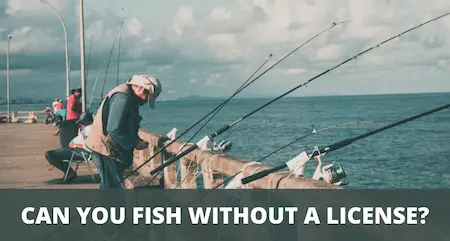Fishing Without A License (Here’s What You Need To Know)
UPDATED 03 NOVEMBER 2023
by Robert Ceran
Whether you’re planning to go fishing for the first time, or have tried it before, it can be tempting to go fishing without a license.
But you need to be aware that this is illegal in most states, and can get you into trouble.
In this article we’ll discuss the legal ways to fish without a license, what exemptions are generally available, and what happens if you get caught without a license.

Is it illegal to fish without a license?
It’s illegal to fish without a license under most circumstances, although there are a few exceptions.
The regulations on who needs a fishing license are different in every US state, but all states have in common that they require the majority of people between the ages of 16 and 65 to have a valid license before they can head out to fish.
Are there legal ways to fish without a license?
Yes, there are legal ways to fish without a license. For example, if you’re a youth, you can fish without a license in all states, but keep in mind that the age requirement for qualifying as a youth varies between states.
For example, in most states you can fish without a license until the age of 16, while Arizona provides that privilege only until the age of 10. So make sure you check the regulations for your state before you go fishing without a permit.
In many states, the following groups are exempted from having to get a fishing license in order to fish:
- Youths under 16
- Seniors over 64
- People with permanent disabilities
- Actively deployed military personnel
- Veterans
But it’s important to keep in mind that the details vary from state to state. For example, people over 64 are exempted in some states, but not in others.
So make sure you check the details at the Fish & Wildlife department of your state. Also, if you do belong in one of the categories that is exempted from having to get a fishing license, make sure to carry proof of your status when you go fishing.
The pricing also varies depending on the state. For more detailed information on this topic check out our article How much does a fishing license cost?
When can you fish without a license?
There are four situations in which you can fish without a license:
- If you belong in one of the categories that is exempted from having to get a fishing license in your state.
- On a free fishing day.
- When fishing on a charter boat, or a licensed pier that takes care of the licensing requirements for you.
- When fishing in a pond on your own private property.
In order to determine if you are in a category that is exempted from getting a fishing license, it’s important to check the regulations for your state specifically, which you can find on the website of your local Fish & Game commission. Also, some states only offer a discount, but not a full exemption for these categories.
Some states, such as Florida, allow fishing charter boats and fishing piers to cover the fishing licensing requirements of their customers (for more on this, check out our article Florida fishing license – everything you need to know).
License free fishing days are offered by all states, and are intended as an opportunity for the general public to try out fishing for free, in order to see if they like it or not. The specific dates of these no-permit fishing days are different from state to state (and in some cases it’s actually a whole weekend). You can check a list of the free fishing days for all states at takemefishing.org.
Finally, there are some situations in which you are allowed to fish on private property without a license (see below for more information).
Can you fish without a license on private property?
Most states allow you to fish without a license in ponds that are entirely located on private property, and if the pond has no tributary stream inlets or outlets.
In a case like that, you are allowed to fish without a license if you are the owner, related to the owner, or an authorized guest of the owner.
On the other hand, if a pond is only partially located on private property, or if it has a stream that connects it to public land, you’ll need to have a fishing license even when you’re fishing on private property.
Similarly, if you own waterfront property on a body of water that is publicly accessible, most states require you to buy a valid fishing license in order to fish on your own property.
Once again, it’s important to keep in mind that the details of these regulations can vary from state to state, so make sure to check the details that apply in your case.
Do you need a fishing license for catch and release?
Yes, the majority of states require you to have a fishing license for catch and release.
In fact, most of them require you to have a license just for attempting to take fish, which means you need to have a valid license just in order to cast your lure or bait out into the water, even if you don’t actually catch any fish.
What happens if you get caught fishing without a license?
If you get caught without a fishing license, this results in a monetary fine in most states, and in some cases even a jail sentence for repeat offenders.
If you’re lucky, and the officer who catches you is in a forgiving mood, you might get away with just a warning. But in most cases you can expect to get a fine, which can amount to a hefty amount of money in some states.
What is the fine for fishing without a license?
The fine for fishing without a license varies by state, and ranges from $15 for a basic fine in Iowa, to $2,000 for catching an endangered fish species in Massachusetts. In most states, the basic fine is around $50.
And while this doesn’t sound like a huge deal, in many states you’ll also be charged an additional fine for every fish caught without a license, which can add up to hundreds, or even thousands of dollars.
Final remarks
In summary, it’s illegal to fish without a license in most circumstances, while there are a few exceptions that allow you to do so.
It’s also worth keeping in mind that the fines for getting caught without a license are usually more expensive than buying an annual license, which enables you to fish legally and without stress.
Finally, it’s also good to know that you’re contributing to the conservation efforts of your state by doing this.

